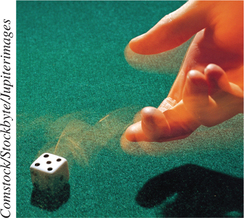EXAMPLE 1Notation for random variables

Suppose our experiment is to toss a single fair die, and we are interested in the number rolled. We define our random variable to be the outcome of a single die roll.
- Why is the variable a random variable?
- What are the possible values that the random variable can take?
- What is the notation used for rolling a 5?
- Use random variable notation to express the probability of rolling a 5.
Solution
- We don't know the value of before we toss the die, which introduces an element of chance into the experiment, thereby making a random variable.
- The possible values for are 1, 2, 3, 4, 5, and 6.
- When a 5 is rolled, then equals the outcome 5, and we write .
- Recall from Section 5.1 that the probability of rolling a 5 for a fair die is 1/6. In random variable notation, we denote this as .